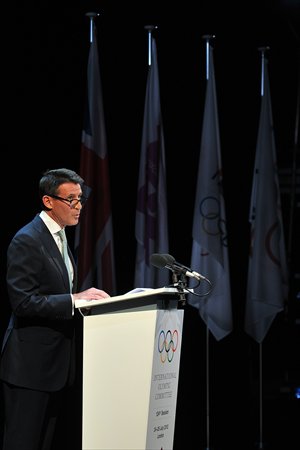HOME >> SPORTS
Coe on mission to save athletics
Source:Reuters Published: 2014-12-5 5:03:08
Former world champion runs for IAAF presidency

Seb Coe in 2012 Photo: CFP
When British Seb Coe was at the peak of his powers in the 1980s, athletics attracted huge TV audiences and often dominated the back pages of newspapers around the world.
Thirty years on, the sport is fighting to make a connection with the next generation.
Although it remains the centerpiece of the Olympic Games, beyond that four-yearly celebration athletics is on the wane and, if it were not for the giant presence of Jamaican sprint superstar Usain Bolt, it would be in real trouble.
A dire shortage of recognizable personalities, an ageing audience, a confusing calendar, a continuing struggle to attract interest in the United States and the dark shadow of doping has left athletics fighting for a foothold in an ever more crowded sporting and leisure landscape.
None of this is news to those who run the sport but Coe, who launched his campaign to become president of the International Association of Athletics Federations (IAAF) on Wednesday, recognizes the need for remedial action is urgent.
"From the moment I joined an athletics club I was hooked for life but I am not hermetically sealed in the past," he said.
"There is much to celebrate, protect and nourish but also much that needs to change. There is a fundamental concern about where our next generation of spectators, TV viewers, competitors and coaches will come from.
"Despite many well-intentioned initiatives we have struggled to excite young people and articulate why athletics matters to them. This is unsustainable."
Such an admission is hard for a man for whom almost his entire life has been based around running.
Inspired by the 1968 Mexico Olympic Games, Coe honed his talent on the municipal tracks, hills and roads of south Yorkshire, as, coached by his father Peter, he developed into the most formidable middle distance runner on the planet.
A clutch of world records and back-to-back 1,500-meter Olympic gold medals, as well as an intense and productive rivalry with fellow Briton Steve Ovett, propelled him to the top of the country's sporting tree.
Ironically though, for a man who routinely dodged Ovett outside of major championship races, one of the issues that Coe has with the sport in the 21st century is its lack of the head-to-head showdowns that fans love.
Bolt, for example, carefully plans his calendar in a bid to maintain his unbeaten records and fans turning up or tuning in for a Diamond League meeting will often find him running in the 200 meters if the cream of the world's sprinting crop are lining up over 100.
It also hardly helps develop global appeal when half or more of an international field line up to race in identical sponsors' kit.
"We have to address that - in fact we were discussing exactly that issue in the council meeting last week," Coe told Reuters.
"We must not confuse a one-day event with our championships, but it is all about presentation if we want young people to engage in our sport."
Coe will fight tooth and nail to protect the position of athletics within the Olympic movement but he accepts that the mass of activity on and around the track can be hugely confusing to the uninitiated and says the sport needs to do much more to help guide and explain to the viewers, both live and on TV.
"I was sitting in front of a group of sponsors at our European championships in Zurich this year and asked them if there was anything in the last half hour they'd understood," he said.
"The answers were very interesting. Spectators need to be drawn in, feel a connection with what they are watching and, crucially, know what they are watching is rooted in trust and integrity.
"While there is no need for panic, the status quo is simply not an option."
Posted in: Feature, Track and field